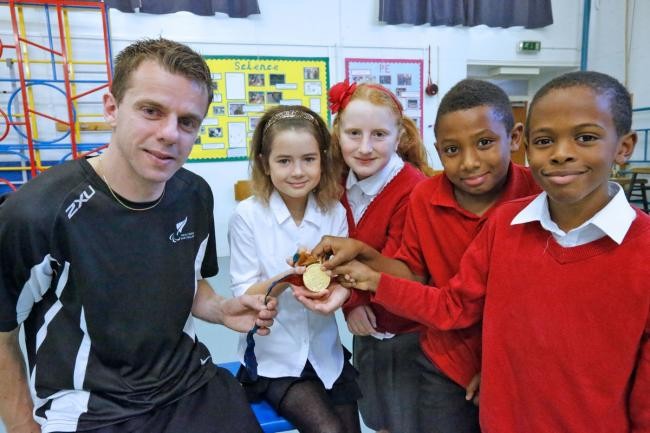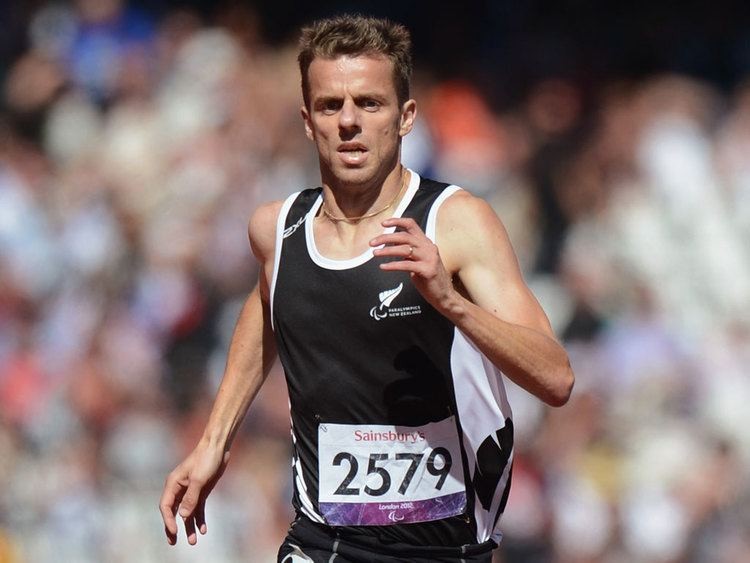The Journey from Sport to Finance: Paralympian Gold medalist, Tim Prendergast, shares his fascinating story from Track to Leadership & Development.
Tim Prendergast is a Kiwi who has lived in London for the last 10 years. He is also a Paralympian Gold medalist, inspirational speaker, wellness coach, and has just started a job in a leading corporate bank.
Here's his Fascinating story.
Growing up in Wellington, New Zealand, like any other 8-year-old kid enjoying life, I was participating in sport and all that kind of stuff and then one day just started to notice that things were a little bit different in terms of the way that I was seeing the world.
It all started with me seeing a small dot in the central part of my vision. This evolved into more of a blindspot and within weeks I had been diagnosed with an eye condition called Macular Degeneration.
Basically it was going to take away 95% of my vision, which was very hard to take. I wouldn’t say “I went off the rails” but it was more internal: losing a whole lot of confidence and belief, along with any kind of ambition for the future.
I went to secondary school and I was encouraged to join the athletics team. Running around a running track was something I was still able to do using my peripheral vision. I did that a bit apprehensively at first but over time really found enjoyment in it. I wasn’t the quickest at first but really enjoyed pushing my body to its limits and started to form lifelong friendships with some of the guys in the team. My mindset was starting to change, from that of “poor Tim, the blind kid, who will never achieve”, to someone starting to believe in themselves and that great things were truly possible.
By the end of secondary school I had come close to representing New Zealand at the Atlantic Paralympic Games, four years later I got my opportunity in Sydney, coming away with two silver medals in the 800m and 1500m.
Over the next four years, my career kept evolving ranking inside the top 10 for 1500m in New Zealand and then in 2004 winning Paralympic Gold in the 800m.

Going into the Beijing Games in 2008, I was Team Captain, T13 1500m World Record Holder and favourite to win 1500m and 5000m, I failed. In the 5000m I collapsed down the home straight and I finished outside of the medals. When I do my speaking I draw the parallels of that disappointment and the disappointment at age eight.
We have two choices when we’re under adversity; do we chuck it all in or do we persevere and be resilient and move on. My choice was the latter and I represented New Zealand again in 2012 and while I didn’t medal there I’m still very proud of how I ran – I always strive to be the best I can be.
More recently, I have turned to the marathon. To date, I have run five marathons with a personal best time of 2hr41m at the London marathon in 2017.
I’ve been really fortunate along the way I’ve been given many opportunities with my training and coming over to London in 2007 as a full time athlete. I have been fortunate enough to use a lot of the skills that I had learnt from sport in terms of communication, contacts, networking and taking opportunities. I had the opportunity in 2008 working for SKY and the Youth Sport Trust as an Athlete Mentor alongside products with the London Olympic Education Team. It was a really fulfilling experience, knowing how sport had changed my life and being able to provide the opportunity for young people to be inspired to be the best they can be.
After 2012, I started my own company ‘TJP More Than a Vision’ and now I am transitioning into the corporate world which is really exciting.
What kept you going through your career?
People around me, my family first and foremost. The sports psychologists and mentors that guided me towards learning about an optimal mindset and not wanting to have regrets at the end. Being a role model and going to schools and sharing my story and saying, “I’ve done that and I want to do this in the future” motivated me.
Do you have one highlight in your athletics career?
The Athens gold medal is the one that really stands out. I guess alongside that in 2003 I came fifth in the open men’s grade in the 1500m. In 2010 I broke the world record in my class in the 1500m. Those are the three significant moments that are all somewhat unique. The last funnily enough, I wasn’t over the line with my hands up – I had broken the world record, but I came in last in an able-bodied grand prix race in Belgium!
Even though that Beijing result was the darkest moment in my career, it’s the event that’s brought so much learning, so it’s significant in another way.
Is there anything that you would do differently?
In the debrief after the Beijing incident a catalogue of things that lead to what happened and obviously I would have done the things slightly differently. But the flip side to that is that after Beijing I made the decision to change some of my support structures and, as a result, trained with a guy called Steve Willis whose younger brother is an Olympic athlete. I got the opportunity to train with him and had I gone to Beijing and performed well I wouldn’t have had these amazing opportunities to perform with these awesome athletes…so, no, I wouldn’t.

So what are you up to now?
Since 2012, up until July 2017, I’ve worked with a Sky Sports sponsored project called Living For Sport which is all about athletes going into schools and sharing their stories and looking at keys to success and how they transfer across life. We target a range of young people, giving them the opportunity to work with an athlete and also to work with their own personal aspirations. There’s also a project called Change For Life, which is about being an ambassador for schools. Then I’ve been doing corporate speaking and all sorts of different mindset based work and over the last couple of years I’ve also covered the well-being side of things.
Are you seeing a rise in the application of holistic methods in the workplace?
It’s certainly getting higher on the agenda here in the UK, particularly with young people. I see it with the anxiety around going to university and entering the workplace. This all falls under the stuff I’ve been working on in the well-being space and through the work I’ve done with sports psychologist. I employ tools used for basic meditation and breathing. It’s certainly not going to be the cure or anything like that but just having some proactive approaches may help people.
Did you use any of those techniques in your running?
Yes, so from 2004, in Athens, when I won gold, I had a really disappointing experience a few days earlier where I came fourth in my 1500m so that was first brush with sports psychology. I really kind of paid lip service to it. Seeing the sports psychologists was amazing and worked me through the process of visualising. It really resonated and it still works. I still talk about that process to this day when I go into schools and post Beijing I learnt some great processes through Neuro Linguistic Programming (NLP) which was very effective and really helped to clear away some of the anxieties around Beijing.
Can you expand on some of the techniques?
I would use a little bit of hypnosis which gets me into a state where I went back in time to the 8-year-old Tim. The 29 year old Tim told the 8-year-old what life was going to be like, all the opportunities he was going to have. That process put everything into perspective given the 8-year-old Tim was trying to cope with losing 95% of his vision. And to see him married, living on the other side of the world and having achieved success in sport has made a huge difference. In fact, it launched my London campaign, where I got sixth place and I ran faster than I did in Athens. The standard had risen but my standard had too as well. Once again I felt that I was the best I could be.
And what's next on your journey?
I’m really excited about this new opportunity working at Santander UK. I have been appointed the role of Personal development Manager. We have got a team of 160 in the specialist sectors group, which is part of the corporate and commercial part of the bank. It is a really exciting role which will enable me to lead strategy around personal development for the workforce - for the 160 people - so that will be both delivering workshops on the experience I’ve gained over the last 20 years. I will also be coaching with individuals from every level of the business alongside ensuring our people agenda is at the forefront of our operation. My professional running career was a journey that featured many highs but also some incredible failures. Calling on all of my experience in being resilient, motivated and determined to be better each and every day, guides me towards delivering some fantastic outcomes in my future working life.